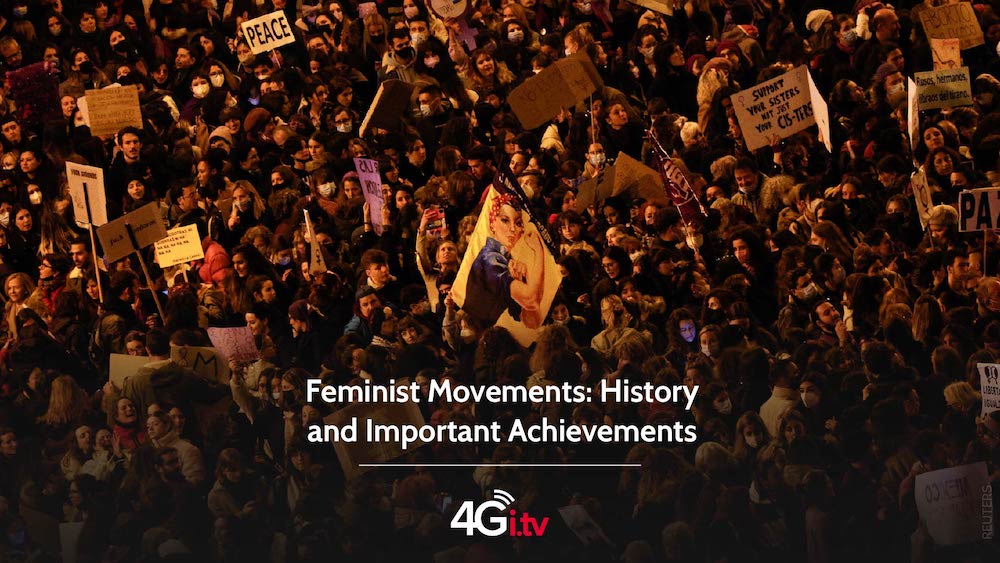Feminist Movements: History and Important Achievements

Do you want to know more about feminist movements throughout history and what their most important achievements have been? In this article we will dive into it.
Feminist movements, throughout history, have been beacons of social change, fighting tirelessly for gender equality and justice for women. In this article, we invite you on a journey through time to explore the history of feminist movements and highlight their most important achievements. Do you want to know more about feminist movements and the milestones that have marked the fight for gender equality? We invite you to continue reading and discover it.
Definition and Origin of Feminism
Feminism is a social and political movement that seeks gender equality, as well as the elimination of discrimination and oppression based on gender. Its objective is to promote the rights and opportunities of women in society on equal terms with men. Throughout history, feminism has evolved and diversified, giving rise to different approaches and currents, but its core has always been the fight for gender equality.
The origin of feminism is found in the struggles and movements that emerged in the 19th century, in response to the inequalities and oppressions that women faced at that time. Although it originated in the 19th century, feminism has continued to evolve and adapt to the changing realities of the world. It has become a global fight, driven by technological advances and the ability of women to connect and share their experiences globally. Over the years, feminism has made significant progress in the fight for gender equality, but still faces challenges today, such as the gender pay gap, gender-based violence, and lack of representation in leadership positions. .
Feminism in Essence
Feminism, at its core, is a social and political movement that advocates for gender equality and fights against discrimination and oppression based on gender. At its core, this movement is based on the following fundamental principles:
- Gender Equality: Feminism promotes the idea that women and men should have equal rights, opportunities and consideration in all aspects of life, including the political, economic, social and cultural spheres. This implies that there should be no discrimination based on gender, and that everyone should be treated fairly, regardless of their gender identity.
- Fight Against Discrimination: Feminism opposes gender discrimination in all its forms. This includes fighting discrimination in the workplace, gender-based violence, the objectification of women, harmful gender stereotypes and any form of gender-based inequality.
- Autonomy and Right to Choose: Feminism defends the right of women to make decisions about their own bodies and lives. This includes autonomy in matters related to sexuality, reproduction and personal decisions, without external interference or coercion.
- Awareness and Education: Feminism advocates raising awareness of gender issues and promoting education around gender equality. This involves analyzing and challenging established gender norms and raising awareness about the inequalities and injustices that women face.
- Solidarity and Empowerment: Feminism promotes solidarity between women and collaboration in the fight for equality. In addition, it seeks to empower women, encouraging them to recognize their own value and potential, and to defend their rights and needs.
Evolution of the Concept Over Time
Throughout history, feminism has been a dynamic movement that has evolved in response to the changing needs and challenges faced by women in society. From its humble roots in the fight for women’s suffrage to its expansion into issues of workplace equality, sexual autonomy, and diversity of gender identities, feminism has undergone a significant evolution.
This section will shed light on the various waves of feminism, its approaches, and the achievements that have contributed to an ever-changing global movement. As we explore this evolution, it is crucial to understand how feminism has responded to the changing needs of women over time and how it continues to be a powerful force in the fight for gender equality today.
First Waves of Feminism
The first waves of feminism represent a crucial period in the history of this movement that has radically transformed the lives of women around the world. From the pioneering fight for the right to vote to challenging society’s entrenched gender norms, this early stage of feminism laid the foundation for future generations of activists. With a detailed look at the achievements and challenges of the first waves of feminism, we will understand how this movement began to question power structures and promote gender equality, triggering unprecedented social change that continues to resonate in the fight for gender justice. genre today.
Women’s Suffrage – The Fight for the Vote
One of the most notable milestones in the history of feminism was the fight for women’s suffrage. This battle, fought with courage and determination, represented one of the most iconic struggles of the first waves of feminism. For centuries, women were excluded from political decision-making and civic participation. However, over time, women organized, demonstrated and rose up to demand their right to vote, arguing that there could be no true democracy without the voice and vote of half the population.
This fight was not easy; The suffragettes faced resistance, repression, and discrimination, but their tenacity and determination led them to significant victories. In 1920, in the United States, the Nineteenth Amendment to the Constitution was ratified, giving women the right to vote. This achievement not only transformed politics, allowing women to actively participate in public life, but also inspired women’s suffrage movements around the world.
Women’s suffrage not only marked a milestone in the history of feminism, but also revolutionized women’s political participation and paved the way for future struggles for gender equality. The achievement of the right to vote was the starting point for many other victories and advances in the feminist struggle, and remains a powerful reminder of the capacity for change when people come together for justice and equality.
Impact of World Wars on Feminism
The two World Wars of the 20th century left a deep mark on the feminist movement. During World War I, women found themselves taking on roles traditionally reserved for men, working in factories, hospitals, and other fields. This created a significant change in the perception of women and their capabilities, boosting the feminist movement by demonstrating their contribution to society and their ability to play roles outside of traditional stereotypes.
World War II also had a fundamental impact on feminism. Women once again found themselves filling essential wartime jobs, which not only reinforced their role in the economy but also highlighted the need for gender equality in all aspects of life. Women who had contributed significantly to victory in the war expected to be rewarded with equal rights and opportunities.
The impact of the World Wars on feminism was not limited to labor issues. These conflicts also generated a greater sense of solidarity among women and fostered the creation of stronger and more active feminist organizations. The pressure exerted by women who had served in times of war contributed to advances in gender equality, such as the recognition of the right to vote in various countries and the enactment of laws prohibiting gender discrimination.
The Second Wave: Feminism in the 60s and 70s
The 60s and 70s marked a period of social and cultural effervescence around the world, and feminism was no exception. During this time there were significant advances in the fight for gender equality. During these decades, feminism expanded beyond suffrage issues and became a movement that challenged traditional norms and restrictions that had limited women’s lives for generations. Sexual liberation, equal labor rights and the promotion of women’s autonomy became central themes.
Sexual Liberation and Equal Labor Rights
The second wave of feminism, which developed in the 1960s and 1970s, was a period of significant progress in the fight for gender equality. Sexual liberation became a central theme, challenging traditional norms and restrictions that had limited women’s sexuality for generations. The movement advocated for autonomy and control over women’s own bodies, promoting sexual education and the availability of contraceptives.
Equal labor rights was also a key focus of this feminist wave. Women demanded equal pay and opportunities in the workplace. Through protests and demonstrations, there was pressure to enact laws prohibiting gender discrimination in employment and promoting equal pay for equal work.
Key Figures and Literary Works
During this era, key feminist figures emerged who had a profound influence on the movement. Authors such as Betty Friedan, with her book “The Feminine Mystique”, revealed the dissatisfaction of women in their traditional role in the home. Other prominent figures, such as Gloria Steinem and Angela Davis, fought tirelessly for women’s rights and racial equality.
Literary works played a fundamental role in the dissemination of feminist ideas. The “Second Wave” produced a series of influential books that examined issues of gender, sexuality, and power. Titles such as “The Room of One’s Own” by Virginia Woolf and “The Female Eunuch” by Germaine Greer became emblematic readings of the feminist movement.
The Third Wave: Feminism in the Modern Era
As the 20th century moved toward its end and the 21st century began, feminism underwent a notable transformation in its focus and scope. The third wave of feminism emerged as a response to the changing realities and challenges of modern society.
During the 1990s and early 21st century, feminism expanded to address issues such as body diversity, gender identity, sexuality, and the importance of giving voice to the experiences of women from different backgrounds. Technology and globalization played a critical role in promoting awareness and collaboration among feminists around the world.
Diversity and Expansion of Feminist Themes
The third wave of feminism, which emerged in the 1990s and early 21st century, is characterized by its diversity and the expansion of feminist themes. This period saw the rise of intersectional feminisms that recognize the intersections of gender, race, sexual orientation, and other identities. Third wave feminists addressed issues such as body diversity, gender identity and sexuality, and focused on giving voice to the experiences of women from different backgrounds.
Technology, Social Networks and Globalization
The third wave of feminism benefited from technological advances, such as the Internet and social media, which allowed for the greater spread of feminist ideas and the organization of activists around the world. Feminism became a global movement, and online platforms allowed women to share their stories and struggles more widely. Globalization facilitated collaboration between feminists from different cultures and nations, which strengthened the movement.
The feminist struggle continued to evolve and adapt to the changing realities of the world. In the next sections, we will explore the “Fourth Wave” of feminism and its current challenges, as well as the future prospects of the movement.
The Fourth Wave and the Future of Feminism
In the digital age and in an increasingly interconnected world, feminism has evolved once again, giving way to what is known as the fourth wave.
The “Fourth Wave of Feminism” has been deeply influenced by the rise of the digital age. Social media, blogs, video platforms and other online media have allowed feminists to share their stories, connect globally and raise awareness about gender issues in an unprecedented way. One of the most prominent movements that emerged from this environment is #MeToo, which became a cry of solidarity for survivors of sexual harassment around the world.
This stage represents an exciting and vital chapter in the history of this movement, and its influence continues to resonate in society today. Through this section, we will understand how feminism continues to adapt and evolve in an ever-changing world, and how it remains a powerful force in the fight for women’s rights and gender equality.
Digital Feminism and #MeToo
The fourth wave of feminism has been deeply influenced by the rise of the digital age. Social media, blogs, video platforms and other online media have allowed feminists to share their stories, connect globally and raise awareness about gender issues in an unprecedented way. One of the most notable movements that emerged from this environment is #MeToo. This campaign, which began as a hashtag on Twitter in 2017, has become a cry of solidarity for survivors of sexual harassment around the world.
MeToo provided a platform for people to share their personal experiences, exposing abusers and changing the conversation around sexual harassment and rape culture. Through the power of social media and technology, #MeToo had a significant impact by challenging entrenched social norms and pushing for accountability. However, it also highlighted the challenges of online activism, such as managing privacy and exposure, as well as the need to balance justice with due process.
Current Challenges and Future Perspectives
Despite the progress made by fourth wave feminism, this movement faces considerable challenges on its path to gender equality. Conservative resistance, the persistence of the wage gap, gender violence, and fights for reproductive rights are just a few examples of the obstacles that persist in the fight for equality. Furthermore, feminism faces the challenge of effectively addressing gender intersections with other forms of discrimination, such as racism and sexual orientation discrimination.
However, despite these challenges, the future of feminism is bright. The movement continues to evolve and adapt to an ever-changing world. Future perspectives include promoting gender equality in education, actively participating in politics, and enacting laws and policies that promote gender equality. The fourth wave of feminism is also moving towards greater inclusion and diversity, recognizing the importance of listening to and giving voice to all women’s experiences in their fight for a more equitable world.
Important Achievements of Feminism
Feminism has been a powerful movement that has made significant progress in the fight for gender equality. Over the years, important achievements have been made in various areas, which has contributed to improving the position of women in society. Below are some of the most notable milestones:
Legislative and Public Policy Changes
Feminism has played a critical role in enacting laws and public policies that promote gender equality. One of the most notable achievements in this area is the approval of women’s suffrage in numerous countries, which allowed women to actively participate in political decision-making. In addition, laws have been established against gender discrimination in the workplace and equal pay policies have been implemented. These changes have paved the way for more equitable treatment of women in society.
Advances in Gender Equality and Social Recognition
Feminism has contributed greatly to the promotion of gender equality and the social recognition of women’s rights. Among the most notable achievements are the promotion of women’s education, the fight against gender violence and the demystification of traditional gender roles. These advances have led to greater awareness and acceptance of gender equality in society, which has improved the lives of women around the world.
Global Impact of Feminism
The impact of feminism transcends national and cultural borders, and has left an indelible mark on various spheres of life. Below, we will look at two key areas where feminism has had a significant global impact:
Influence on Popular Culture and Media
Feminism has played a crucial role in the transformation of popular culture and media. Positive representation of women in films, television shows, music and literature has been promoted, helping to break down harmful gender stereotypes. In addition, the feminist movement has promoted awareness campaigns and denunciation of the objectification of women in the media, promoting a more respectful and empowered image of women in society.
Feminism in Different Cultures and Societies
Feminism is not a monolithic movement; It has evolved and adapted to various cultures and societies around the world. Each region has addressed gender issues uniquely, incorporating local struggles and cultural traditions into the fight for gender equality. From Islamic feminism to African feminism and Latin American feminism, the various manifestations of the feminist movement have contributed to challenging gender norms and promoting equality in specific cultural contexts.
In summary, feminism has made important progress in terms of legislative changes, gender equality and social recognition. Its global impact has been felt in popular culture, the media, and in various cultures and societies around the world, demonstrating the relevance and continued need of this movement in the fight for gender equality.
Important Reflections
The path taken by feminism throughout history has been full of significant achievements and challenges that persist in the fight for gender equality. These reflections invite us to consider the progress achieved and the tasks pending in the feminist movement.
The Road Traveled and the Challenges That Remain
Feminism has come a long way since its inception, making notable progress in areas such as women’s suffrage, equal employment rights, and the representation of women in the media. However, despite these achievements, significant challenges remain. The gender pay gap, violence against women, and lack of equality in decision-making are just some of the obstacles that feminists continue to face today. Reflecting on the path we have traveled helps us understand the magnitude of the achievements and the urgency of addressing the challenges that still persist.
How to Contribute to the Feminist Cause Today
Feminism is not just a thing of the past; It is a constantly evolving movement that requires the commitment and participation of all people in society. Contributing to the feminist cause today means being aware of gender issues, supporting gender equality in all aspects of life, and advocating for change. This may involve participating in campaigns, educating about gender issues, supporting feminist organizations and promoting equality in the workplace and everyday life. Reflecting on how each individual can contribute to the feminist cause is essential to achieving a more equitable future.
In short, observations about the path taken by feminism and the challenges that remain, as well as how to contribute to the feminist cause today, are essential to understanding the evolution and continued relevance of this movement in the pursuit of equality. of genre. Feminism has left a deep mark on history and society, and its legacy is a source of inspiration for future generations of equality activists.
POPULAR POSTS
LIVE STREAM







